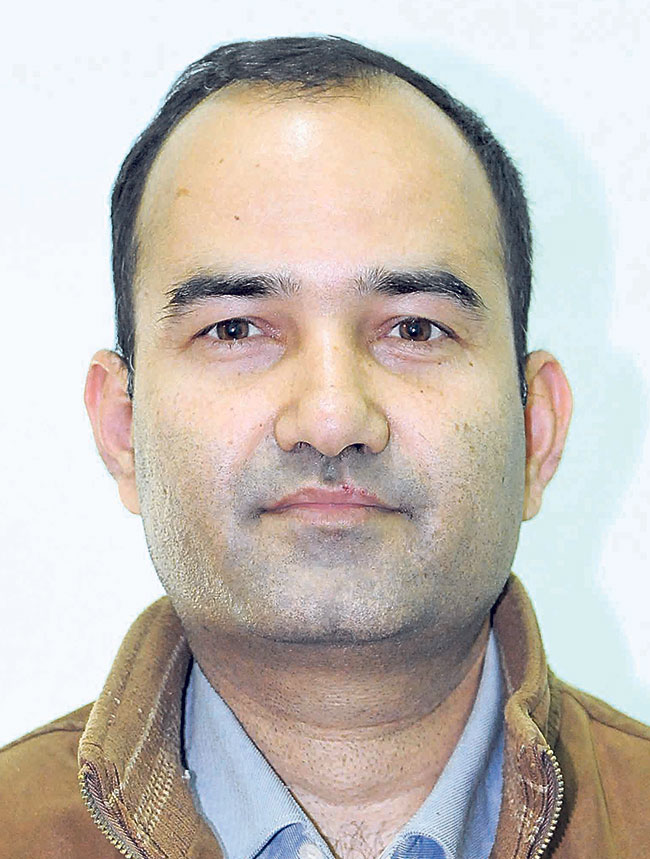While all of us know what blood pressure means, not many of us have it monitored on a regular basis or go for annual checkups either, which might mean that even if we suffer from or have the tendency to suffer from blood pressure problems, it is largely going unchecked. According to Dr Deepak Raj Pandey, blood pressure problems have become extremely common and it can be dangerous if left uncontrolled. Hence, The Week caught up with Dr Pandey, general physician at Manmohan Memorial Hospital in Thamel, Kathmandu, to understand the symptoms, precautions, and measures for stabilizing blood pressure.
 Understanding the numbers
Understanding the numbers
First things first, you need to understand how blood pressure is measured. Every instrument used to measure blood pressure gives results in two kinds of numbers or levels. The first or the upper number is called the systolic blood pressure and it is the highest level of blood pressure, measured when your heart beats. The second kind is the diastolic blood pressure and this is the lowest level your blood pressure reaches when your heart relaxes.
In most cases, the ideal blood pressure is 120/80mm of Hg. “High blood pressure or hypertension means your blood pressure is mostly 130 over 90 or more. On the other hand, low blood pressure or hypotension means your systolic pressure is 90 or less and your diastolic pressure is 60 or less,” says Dr Pandey. “But it is important to understand that some people have low blood pressure. It might be 110 by 70 or a little less too. In such cases, there may be nothing to worry about but you must always consult a physician just to be sure,” he says adding you should never take over the counter drugs for blood pressure.
Important symptoms
“High blood pressure may not always have specific symptoms and that is why it can be dangerous. Most of the time, you may not know that you have high blood pressure,” says Dr Pandey.
It is best to visit a physician to understand the magnitude of your problem. “If you have a close relative who suffers from hypertension, there are chances that you might also have hypertension or will suffer from hypertension in the long run. So you must opt for regular checkups. At least get an annual checkup to monitor your heart health,” adds Dr Pandey.
Under pressure

However, according to Dr Pandey, in case of severely high blood pressure, there are a few symptoms that you need to look out for. He says severe headache, fatigue, vision problems, difficulty in breathing, irregular heartbeats, or pounding in your chest, neck or ears can be some of the symptoms of hypertension.
“Unlike high blood pressure, low blood pressure or hypotension causes very little problems in the human body. But for some low blood pressure can have severe effects too. Dizziness or lightheadedness, fainting or syncope, blurred vision, nausea, fatigues and lack of concentration are some of the common problems related to hypotension,” he says adding that extreme hypotension can cause confusion especially among old people, shallow breaths, as well as weak and rapid pulse.
Hypertension information
“It is important to find the cause behind high blood pressure before you start treating it. Some of the obvious reasons for hypertension are obesity, unhealthy eating or drinking habits and hormonal imbalance,” says Dr Pandey.
Living a healthy lifestyle is one of the most effective ways to control blood pressure. However, it is advisable that you stick to the medication given by your doctor at all times.
According to Dr Pandey, losing some extra kilos is an effective way to stabilize high pressure if you are overweight. This is because your blood pressure increases when your body weight rises. But excess exercise is also not good for your body. “Make sure you do not exhaust yourself while exercising. Start with exercising for half an hour a day and slowly increase it to one hour per day. An effective exercise should be balanced with healthy eating habits too,” says Dr Pandey.
Good diet can also be very helpful in managing or stabilizing blood pressure. Those who have high blood pressure should avoid saturated fat, excess carbohydrate, sugar and salt. Vegetables are best source of potassium that can be very helpful in reducing blood pressure. Potassium balances the harm caused by salt in our body.
“If one has high blood pressure, it is also important to control the amount of alcohol they drink. A large amount of alcohol can increase blood pressure. Also it is advisable not to have caffeine. Caffeine has the tendency to raise blood pressure. Quitting smoking can definitely stabilize your blood pressure to a large extent,” says Dr Pandey.
Hypotension explained
“Hypotension may occur due to an infection, an operation, diarrhea, hormonal imbalance or a hoard of other external factors. So it is important to know the cause of hypotension too before treating it,” says Dr Pandey.
Nevertheless, some simple modifications to your lifestyle can make a huge difference in increasing your blood pressure as well. One of the most effective ways is to have food higher in salt content. Dehydration can also cause low blood pressure and it can be easily corrected by consuming salt rich food or lots of non-alcoholic liquid. According to Dr Pandey, regular exercise also promotes blood flow and helps in increasing blood pressure.
Exposure to hot water, spa or steam for a long time may be dangerous for those suffering from low blood pressure. “Extended exposure to steam or hot water bath may dilate blood vessels to help your body cool down. Your blood then diverts towards the skin which causes a drop in blood pressure,” says Dr Pandey. Therefore, in order to stabilize blood pressure, one must avoid long hot water baths and steam bath.

























-1200x560-1771928761.webp)












